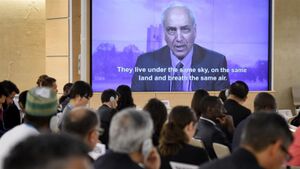Michael Lynk
 | |
| Born | Stanley Michael Lynk 1952 |
| Alma mater | Dalhousie University |
Michael Lynk, a professor in the faculty of law at Western University in London, Ontario, was named on 24 March 2016 as "United Nations Special Rapporteur on the situation of human rights in the Palestinian territories occupied since 1967" – a contentious position if ever there was one, especially as the past holders of this office have generally interpreted their mandate as looking largely at alleged human rights violations by the occupying power: Israel.
Contents
Three-pronged attack
Professor Lynk's appointment was quickly opposed on three fronts:
UN Watch
Hillel Neuer, the Canadian director of UN Watch based in Geneva who described him as "an ardent anti-Israeli activist for at least three decades [who] plays a leadership role in groups that advocate against Israel, and participates in political campaigns that use demonizing language against Israelis." Among other things, Neuer alleged that Prof. Lynk "cited Nazi war crimes in his call for 'legal strategies' to prosecute Israelis," that he supports a protest movement known as "Israel Apartheid Week" at Western, and that he "blamed the West for provoking the attacks" on 9/11. Concluding Neuer said Lynk "fails the minimal impartiality requirements of a UNHRC rapporteur."
CIJA
In Canada, the Centre for Israel and Jewish Affairs (CIJA) followed suit:
- "We strongly denounce the appointment of Michael Lynk to this role," Shimon Fogel, the centre's CEO, wrote in a statement: "Mr Lynk has a long record of involvement with anti-Israel initiatives and has repeatedly made public statements that demonstrate hostility towards Israel. For us, it's not about Michael Lynk. The real question here is whether he's an appropriate selection for the particular position in question."
- The answer, Shimon Fogel said, is no: "Michael Lynk is not objective. He has chosen sides. He's entirely free to do that but that disqualifies him from being an impartial rapporteur."
Stéphane Dion
Before Prof. Lynk had a chance to defend himself, Foreign Affairs Minister Stéphane Dion tweeted:
- "We call on @UNHRC to review this appointment & ensure Special Rapporteur has the track record that can advance peace in the region."[1]
Spirited defence
In an exclusive interview with the Globe and Mail, Prof. Lynk acknowledged he had chosen sides:
- "My allegiance," he said, "is to international law, to human rights law."
- "As Franklin Roosevelt once said: 'I'm open-minded but not empty-minded.'"
Mr Lynk, a former labour lawyer before joining Western University in 1999, complained that in these recent attacks he has been found guilty "by association."
Merely speaking at a conference does not mean he supports everything that others say there:
- "I didn't use the word apartheid," Lynk insisted. "Someone else did."
- "I don't think I've ever used that word in the Israeli-Palestinian context."
He admitted using the term Nazi at an academic conference but only as an historical footnote:
- "I would never use an analogy like that [when it comes to Israel]" he said. "It is odious."
He said he thinks that the anger that followed his appointment "is less about me … than about the office itself. I'm just collateral damage."
He understands why Israel is upset about the appointment:
- "Any country that has a human rights magnifying glass hovering over it would be uncomfortable," he said.
Prof. Lynk acknowledged that in the 22 years of there being a UNHRC special rapporteur none had taken the mandate much beyond monitoring Israeli behaviour. Should that mandate be expanded to include possible human rights abuses by Palestinian authorities in the West Bank and Gaza?
- "It's a fair question, I'm open to looking at expanding the job."[2]
Mandate
The mandate of the United Nations Special Rapporteur on the situation of human rights in the Palestinian territories occupied since 1967 derives from the 1993 resolution from the Committee of Human Rights. The mandate calls on the Special Rapporteur:
(a) To investigate Israel's violations of the principles and bases of international law, international humanitarian law and the Geneva Convention relative to the Protection of Civilian Persons in Time of War, of 12 August 1949, in the Palestinian territories occupied by Israel since 1967;
(b) To receive communications, to hear witnesses, and to use such modalities of procedure as he may deem necessary for his mandate; and,
(c) To report, with his conclusions and recommendations, to the Commission on Human Rights at its future sessions, until the end of the Israeli occupation of those territories.[3]
Statement by Special Rapporteur
On 27 May 2021, Michael Lynk made a long statement to the UNHRC which included:
Over the past dozen years, the Human Rights Council has commissioned four major independent reports on the human rights situation in occupied Palestine, all initiated in the shadow of another round of extreme violence, with the causalities overwhelmingly on the Palestinian side. The constant theme in each of these four reports has been the serious violations of human rights and humanitarian laws by Israel, along with a prevailing culture of exceptionalism and impunity.
Time allows me to cite only one of these reports. The report on the violence in Gaza in 2008 and 2009 – sometimes known as the Goldstone Report – stated that:
- “Justice and respect for the rule of law are the indispensable basis for peace. The prolonged situation of impunity has created a justice crisis in the Occupied Palestinian Territory that warrants action”.
Twelve years later, those words sting because they describe so acutely today that which has been allowed to continue to fester unchallenged and unchanged. All four of these reports have asked:
- “Where is accountability?”
I ask:
References
- ↑ "Dion questions appointment of Canadian as UN human rights advisor"
- ↑ "UN appointment of Canadian professor creates controversy"
- ↑ "The Mandate of the Special Rapporteur on the situation of human rights in the Palestinian Territory occupied since 1967"
- ↑ "Statement of the Special Rapporteur to UNHRC Special Session"